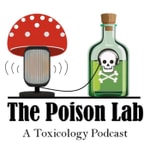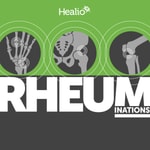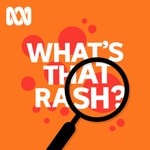The Poison Lab – Details, episodes & analysis
Podcast details
Technical and general information from the podcast's RSS feed.

The Poison Lab
Ryan Feldman PharmD DABAT
Frequency: 1 episode/29d. Total Eps: 56

Recent rankings
Latest chart positions across Apple Podcasts and Spotify rankings.
Apple Podcasts
🇺🇸 USA - medicine
06/11/2024#77🇨🇦 Canada - medicine
23/09/2024#96🇨🇦 Canada - medicine
16/09/2024#80🇨🇦 Canada - medicine
11/09/2024#72🇫🇷 France - medicine
04/09/2024#100🇫🇷 France - medicine
03/09/2024#75🇫🇷 France - medicine
02/09/2024#47
Spotify
No recent rankings available
Shared links between episodes and podcasts
Links found in episode descriptions and other podcasts that share them.
See allRSS feed quality and score
Technical evaluation of the podcast's RSS feed quality and structure.
See allScore global : 53%
Publication history
Monthly episode publishing history over the past years.
The Poison Letter To The Editor: Listener Critiques and Author Responses for The AHA 2023 Life Threatening Poisoning Guidelines with Dr. Michael Mullins, Dr. Donna Seger, Dr. Leon Gussow, and Dr. Eric Lavonas
mercredi 28 août 2024 • Duration 23:47
In this episode the poison lab hosts scientific discourse . Three listeners (Dr. Michael Mullins, Dr. Donna Seger, and Dr. Leon Gussow) write in their critiques surrounding specific recommendations and language used with the AHA 2023 Management of Poisoning Cardiac Arrest or Life-Threatening Toxicity guidelines. Lead author of the guidelines Dr. Eric Lavonas then responds to and addresses their points with counterpoints or appraisals. Tune in and draw your own conclusions!
Send in Your Questions For "Ask a Toxicologist"
mardi 13 août 2024 • Duration 02:07
Have a burning question you have always wanted to ask a toxicologist? What are tips for managing an anticholinergic overdose? What is the deadliest poison? Why are they called lead pencils if there is no lead?! Send your questions in to toxtalk1@gmail.com to take part in a future episode! (If you would like to be anonymous simply state it in the email)
APAPalooza. A North American Congress of Clinical Toxicology 2023 Acetaminophen Research Highlight
Episode 27
dimanche 19 novembre 2023 • Duration 51:31
In this episode, Ryan dives into cutting-edge research on the treatment of acetaminophen (APAP) overdose, featuring interviews with authors of several key abstracts from the North American Congress of Clinical Toxicology (NACCT) in Montreal Canada (Abstracts and posters available in the show notes). We get first looks insights into research evaluating the impact of fomepizole high risk acetaminophen overdose, as well as who gets fomepizole for acetaminophen overdose and dies. Then we evaluate the effectiveness of standard N-acetylcysteine (NAC) treatment in high risk patients and high dose NAC in high risk patients. Join us for an insightful discussion on these advancements that are reshaping the management of APAP toxicity. Guests include Dr. Masha Yemets PharmD, Dr. Molly Stott PharmD, Dr. Alexandru Ulici PharmD, and Dr. Michael Moss MD.
- Link to published abstracts
- (First guest) Abstract #126 Characterizing fomepizole use in acetaminophen deaths reported to US poison centers- Dr. Yemets
- (Second guest) Abstract #125 Clinical impact of fomepizole as an adjunct therapy in massive acetaminophen overdose- Dr. Stott
- (Third guest) Abstract #131 Comparison of low-risk and high risk acetaminophen ingestions using the standard prescott protocol of intravenous N-acetylcysteine- Dr. Ulici
- (Fourth guest) Abstract #130 High-risk acetaminophen overdose outcomes after treatment with standard dose vs. increased dose N-acetylcysteine- Dr. Moss
- Other studies discussed regarding NAC dosing
AHA 2023 Management of Poisoning Cardiac Arrest or Life-Threatening Toxicity Guidelines with Co-Author Dr. Eric Lavonas MD
Episode 25
dimanche 15 octobre 2023 • Duration 50:38
In this episode, Ryan sits down with Dr. Eric Lavonas MD, a seasoned EM resuscitation guideline writer, emergency medicine physician, medical toxicologist, and lead author of the latest update to the American Heart Association's guidelines for the management of cardiac arrest and life-threatening toxicity due to poisoning. They have an in-depth discussion as they explore the key aspects of the 2023 AHA treatment recommendations and the rationale behind each decision point. A great review to discover how to effectively apply these guidelines in real-world scenarios and find out what knowledge gaps exist in the realm of toxin resuscitation. Be sure to also check out the accompanying mini-episode for a high-yield review of the major treatment recommendations.
High Yield Highlight- 2023 American Heart Association Focused Update on the Management of Patients With Cardiac Arrest or Life-Threatening Toxicity Due to Poisoning
dimanche 15 octobre 2023 • Duration 15:30
In this episode Ryan does a high yield "just the facts" break down of the recently released "2023 American Heart Association Focused Update on the Management of Patients With Cardiac Arrest or Life-Threatening Toxicity Due to Poisoning: An Update to the American Heart Association Guidelines for Cardiopulmonary Resuscitation and Emergency Cardiovascular Care". Tune in to learn about the most recent treatment recommendations made by AHA via a panel of toxicology experts. This was released alongside a full interview with the lead author Dr. Eric Lavonas MD. Be sure to check out the full interview to hear it straight from the source! (link in show notes).
The Poison Lab Does Psilocybin- A Deep Dive with Psilocybin Research Pharmacist Dr. Paul Hutson
Episode 24
mercredi 20 septembre 2023 • Duration 01:37:38
In this enlightening episode, Ryan engages in a deep conversation with Dr. Paul Hutson, PharmD, a renowned researcher in the field of psilocybin and director of the Transdisciplinary Center for Research in Psychoactive Substances at the University of Wisconsin Madison. Dr. Hutson shares his extensive knowledge and insights into the promising role of psilocybin in the treatment of depression and substance use disorder.
Throughout the discussion, they delve into the research that supports the use of psilocybin in medical therapy, shedding light on the rigorous processes involved in conducting such studies. Dr. Hutson elucidates the efficacy and safety findings that have emerged from his and others research, offering listeners a glimpse into the potential future of psilocybin in mainstream medical practices. Listeners will gain a deeper understanding of the meticulous approach to research that ensures both safety and effectiveness. Dr. Hutson shares firsthand experiences and observations, providing a rich and detailed perspective on the current state of psilocybin research. Moreover, the conversation ventures into the practical aspects of integrating psilocybin into contemporary medical practices, discussing the potential frameworks and guidelines that would govern its use. They explore what the future might hold for patients and practitioners alike as they stand on the cusp of a revolutionary shift in mental health treatment.
Whether you're a healthcare professional keen on the latest developments in medical research or someone interested in the evolving landscape of mental health treatment, this episode promises to be a rich source of information and insight. Tune in to be informed and to foster a deeper understanding of the promising horizon that psilocybin research is unveiling in the medical community.
- Biography for Dr. Paul Hutson PharmD
- Transdisciplinary Center for Research in Psychoactive Substances
- Dr Hutson's Publications
- Other referenced studies
New Podcast Artwork & Tox Trinkets!
lundi 4 septembre 2023 • Duration 02:20
New Art and New Tox Trinkets. If you want to share your tox joy in the real world, find some trinkets here: https://www.etsy.com/shop/thepoisonlab
Acetaminophen Poisoning Management: US & Canada Consensus Statement with Co-Author Dr. Richard Dart, MD, PhD
Episode 23
vendredi 18 août 2023 • Duration 53:04
In this Ryan sits down with Dr. Richard Dart MD, PhD. He is the lead author of the recently released "Management of Acetaminophen Poisoning in the US and Canada Consensus Statement" from the American Academy of Clinical Toxicology, American College of Medical Toxicology, Americans Poisons Centers, and the Canadian Association of Poison Centers. Listen to be informed on the most recent treatment recommendations. They dive in to the definitions established by the guideline and notable treatment recommendations, dissecting the ratinonale for each desiscion point and how to apply the guidelines. A mini episode was released along side this episode that is a high yield review of major treatment recommendations and definitions estabilished by the consensus statement.
Links :
- Mini episode- High-yield over view of Management of Acetaminophen Poisoning in the US and Canada Consensus Statement
- Guidelines https://jamanetwork.com/journals/jamanetworkopen/fullarticle/2808062
Definitions made by the guideline
- Acute ingestion
- Any overdose taken with 24 hours period
- Overdose "dose" not defined
- >7.5 g in 24 h was criteria for Rumack Matthew nomogram
- Consensus statement
- Adult overdose at 10g/d or 200 mg/kg/d in <24 hours= potentially toxic
- Pediatric <6 year at 150 mg/kg/d in <24 h = potentially toxic
- Overdose "dose" not defined
- Any overdose taken with 24 hours period
- Repeated Supra Therapeutic Ingestion (RSTI)
- Overdose "dose"
- Repeated dosing totaling
- 6g/d or 150 mg/kg/day x 24-48 h = potential toxic
- 4g/d or 100 mg/kg/day x >48 h = potential toxic (Recognize this means some people could be toxic at therapeutic dosing, but if they do not have symptoms not likely)
- Repeated dosing totaling
- Overdose "dose"
- High risk ingestion
- Reported dose >30 grams OR
- [APAP] 2 x Rummack-Matthew nomogram treatment line
- NAC stopping criteria
- APAP<10
- INR<2
- AST/ALT Normal for patient or decreased by 25-50%
- Patient clinically well
Notable treatment recommendations
- RSTI
- If patient has history of RSTI (>6 g x 24-48 h, >4 g x >48 hours) AND signs of APAP toxicity (vomiting, RUQ abd pain, AMS)
- Treat if APAP >20 ug/ml OR AST/ALT elevated
- If patient has history of RSTI (>6 g x 24-48 h, >4 g x >48 hours) AND signs of APAP toxicity (vomiting, RUQ abd pain, AMS)
- Acute
- Non-detectable [APAP] between 2 and 4 hours excludes ingestion
- Give SDAC w/in 4 hours (something I’ve been a proponent of since ATOM2)
- Treat
- Start treatment with NAC if unable to plot on nomogram by 8 hours
- NAC dose
- “Higher dose” NAC (undefined) for high risk ingestion
- Minimum NAC regimen should include 300 mg/kg orally or within 20-24 hours
- CAP NAC dose at 100 kg (this was known with PO, but IV there was always some question since it delivers less overall)
- Unique scenarios
- Line crossers
- APAP with anticholinergic or opioid
- If 1st concentration below treatment line repeat in 4-6 hours
- APAP Extended release
- If 1st concentration below treatment line @ 4-12 hours, repeat in 4-6 hours
- APAP with anticholinergic or opioid
- Dialysis-
- Dialyze If APAP >900 w/ AMS or acidosis.
- NAC IV rate during HD 12.5 mg/kg/hr minimum. No dose change for PO (not new but good reminders)
- Line crossers
- Consult liver transplant for rapid AST/ALT inc w/ coagulopathy, AMS, or mulistytem organ failure
- The addition of fomepizole to acetylcysteine in the treatment of serious acetaminophen ingestions has been proposed. The panel concluded that the data available did not support a standard recommendation. As for any complicated or serious acetaminophen poisoning, a PC or clinical toxicologist should be consulted.
High Yield Highlight-Consensus Statement on Management of Acetaminophen Poisoning in the US and Canada
vendredi 18 août 2023 • Duration 13:11
This episode is a a high yield "just the facts" break down of the recently released "Management of Acetaminophen Poisoning in the US and Canada Consensus Statement" from the American Academy of Clinical Toxicology, American College of Medical Toxicology, Americans Poisons Centers, and the Canadian Association of Poison Centers. Listen to be informed on the most recent treatment recommendations. This was released alongside a full interview with the consensus statement corresponding author Dr. Richard Dart MD, PhD. Be sure to check out the full interview to hear it straight from the source! (link in show notes).
Link to the guidelines:
- Full interview with consensus statement author Dr. Richard Dart
- https://jamanetwork.com/journals/jamanetworkopen/fullarticle/2808062
Definitions made by the guideline
- Acute ingestion
- >7.5 g in 24 h per Rummack Matthew initial studies
- 10 g/d or 200 mg/kg/day in <24 h also suggested
- Repeated Supra Therapeutic Ingestion (RSTI)
- Repeated dosing totaling
- 10g or 200 mg/kg in 24 hour
- 6g/d or 150 mg/kg/day x 48 h
- 4g/d or 100 mg/kg/day x >48 h
- High risk ingestion
- Reported dose >30 grams OR
- [APAP] 2 x Rummack-Matthew nomogram treatment line
- NAC stopping criteria
- APAP<10
- INR<2
- AST/ALT Normal for patient or decreased by 25-50%
- Patient clinically well
Notable treatment recommendations
- RSTI
- If patient has history of RSTI (>6 g x 24-48 h, >4 g x >48 hours) AND signs of APAP toxicity (vomiting, RUQ abd pain, AMS)
- Treat if APAP >20 ug/ml OR AST/ALT elevated
- If patient has history of RSTI (>6 g x 24-48 h, >4 g x >48 hours) AND signs of APAP toxicity (vomiting, RUQ abd pain, AMS)
- Acute
- Non-detectable [APAP] between 2 and 4 hours excludes ingestion
- Give SDAC w/in 4 hours (something I’ve been a proponent of since ATOM2)
- Start treatment with NAC if unable to plot on nomogram by 8 hours
- NAC dose
- “Higher dose” NAC (undefined) for high risk ingestion
- Minimum NAC regimen should include 300 mg/kg orally or within 20-24 hours
- CAP NAC dose at 100 kg (this was known with PO, but IV there was always some question since it delivers less overall)
- Unique scenarios
- Line crossers
- APAP with anticholinergic or opioid
- If 1st concentration below treatment line repeat in 4-6 hours
- APAP Extended release
- If 1st concentration below treatment line @ 4-12 hours, repeat in 4-6 hours
- APAP with anticholinergic or opioid
- Dialysis-
- Dialyze If APAP >900 w/ AMS or acidosis.
- NAC IV rate during HD 12.5 mg/kg/hr minimum. No dose change for PO (not new but good reminders)
- Line crossers
- Consult liver transplant for rapid AST/ALT inc w/ coagulopathy, AMS, or mulistytem organ failure
- The addition of fomepizole to acetylcysteine in the treatment of serious acetaminophen ingestions has been proposed. The panel concluded that the data available did not support a standard recommendation. As for any complicated or serious acetaminophen poisoning, a PC or clinical toxicologist should be consulted.
Toxicologists vs the Internet (#9) With Guest Dr Frank Paloucek PharmD DABAT FAACT
Episode 23
mercredi 9 août 2023 • Duration 01:28:32
Dr. Frank Paloucek, PharmD, DABAT (@itsalltox) joins the show. He was one of the very first emergency medicine pharmacists and one of the original board-certified clinical toxicologists (DABAT). He is now a proudly retired professor emeritus at The Univeristy of Illinois at Chicago. In his tenure there he spent nearly 20 years as the program director for their clinical pharmacy residency, was an integral part of the Toxikon Consortium toxicology fellowship, and coauthored the text book "Poisoning and Toxicology Handbook (Poisoning and Toxicology Handbook (Leiken & Paloucek's)) 4th Edition. Frank and Ryan kick off the show hearing about Frank's fledgling years working in an emergency department without EM attendings. Then they bust some toxicology myths (do you REALLY need BAL before Calcium disodium edetate in severe lead poisoning? Frank thinks no...) before jumping into solving some toxic cases. Finally, the episode ends with Frank and Ryan solving a case of poisoned AI. They ask GPT to take on the role of a poisoned patient and work together to identify the culprit. Enjoy and don't forget to leave a review.
- Introduction
- Stump the toxicologist









